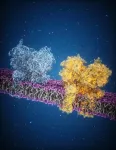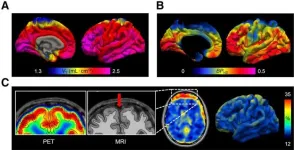(Press-News.org) TUCSON, Ariz., March 26, 2025 – Critical Path Institute® (C-Path)Patient-Reported Outcome (PRO) Consortium and Electronic Clinical Outcome Assessment (eCOA) Consortium are pleased to announce the successful conclusion of the eCOA: Getting Better Together Initiative. This initiative, driven by a shared commitment to advancing patient-focused drug development, has culminated in meaningful, lasting changes that will benefit all stakeholders across the eCOA ecosystem.
Beginning in 2019, this C-Path-led collaborative, pre-competitive initiative brought together clinical trial sponsors from the PRO Consortium, as well as eCOA technology and allied service providers from the eCOA Consortium. This partnership focuses on identifying and addressing the root cause of issues with eCOA implementation in clinical trials. As a public-private partnership, C-Path’s consortia lead pre-competitive projects and working groups like the eCOA: Getting Better Together Initiative in which scientists from global regulatory agencies participate. Through in-depth analysis, stakeholder engagement, and the development of targeted solutions, the teams have produced key resources that include:
Best practice recommendations published in peer-reviewed journals focusing on user acceptance testing for systems designed to collect clinical outcome assessment (COA) data electronically, dataset structure and standardization to support drug development, and eCOA data changes
A common lexicon among eCOA providers, sponsors, and regulators designed to reduce miscommunication, comprehension errors, and inefficiencies with terminology
Stakeholder alignment on patient-centric approaches, resulting in more intuitive and accessible eCOA tools that enhance patient engagement and data accuracy
Collaborative efforts to address regulatory considerations and streamline the path to approval for clinical trials that use eCOA technologies.
While C-Path will continue to address the need for continued, authoritative leadership in the eCOA and DHT ecosystems by driving collaboration to address key and unmet needs, the completion of the eCOA: Getting Better Together Initiative allows all contributors to acknowledge the successes of the effort, and also allow us to reframe our ongoing and future collaborations to move beyond those with a specifically operational focus. Through these broad-reaching collaborations with our Consortium Members, C-Path remains steadfast in its commitment to advancing patient-focused drug development.
“One of the greatest successes of the eCOA: Getting Better Together Initiative, beyond the significant improvements to ways of working and guidance in COA data collection, was in breaking down barriers between the key actors in this space, including sponsors, eCOA partners, and linguistic validation partners,” said Kate Zarzar, Principal PCOR Scientist, Study Execution Franchise Lead, Genentech, a Member of the Roche Group. “It created a more open, collaborative environment and fostered a sense of shared ownership and accountability for the success of the COA space in support of patients. This will continue to yield dividends in years to come for the collection of patient-relevant evidence.”
Paul O’Donohoe, MSc, Senior Director, eCOA Product and Science, Medidata Solutions, stated, “The eCOA: Getting Better Together Initiative has been a crucial catalyst for sponsors, vendors and regulators to truly collaborate in addressing some of the shared challenges we face in maximizing the potential of eCOA technologies. The rising tide of successes the initiative has sparked benefits the entire industry and sets the scene for real technology-driven innovations in the years to come.”
“As a sponsor, being part of the eCOA: Getting Better Together Initiative has been an invaluable experience,” said Trish Delong, MS, Associate Director, Patient Reported Outcomes, Johnson and Johnson Innovative Medicine. “This collaboration has allowed us to gain insights and experience with technology providers and regulators, aligning on solutions that streamline eCOA implementation and improve data quality. The progress we’ve made together is a testament to the power of collective action and shared vision in advancing patient-centric innovation in clinical trials.”
Kate Zarzar, Paul O’Donohoe, and Trish Delong all served as members of the eCOA Leadership Team, a cross-consortia group that oversees the execution of collaborative efforts such as the eCOA: Getting Better Together Initiative.
For more information about the eCOA: Getting Better Together Initiative, please see the Q4 2024 report.
About Critical Path Institute
Founded in 2005, as a public-private partnership in response to the FDA’s Critical Path Initiative, Critical Path Institute® (C-Path) celebrates its 20th anniversary as a vital, independent, nonprofit. C-Path’s mission is to lead collaborations that advance better treatments for people worldwide. Globally recognized as a pioneer in accelerating drug development, C-Path has established numerous international consortia, programs and initiatives that currently include more than 1,600 scientists and representatives from government and regulatory agencies, academia, patient organizations, disease foundations and pharmaceutical and biotech companies. With dedicated team members located throughout the world, C-Path’s global headquarters is located in Tucson, Arizona and C-Path’s Europe subsidiary is headquartered in Amsterdam, Netherlands. For more information, visit c-path.org.
Media Contacts:
Roxan Triolo Olivas
C-Path
520.954.1634
rolivas@c-path.org
Kissy Black
C-Path
615.310.1894
kblack@c-path.org
END
C-Path announces successful conclusion of the ECOA: getting better together initiative
Collaboration has culminated in meaningful, lasting changes for the benefit of stakeholders in the electronic collection of clinical outcome assessment data in clinical trials
2025-03-28
ELSE PRESS RELEASES FROM THIS DATE:
Brain channels ‘stopped in time’ reveal chemical flow that enables learning and thinking
2025-03-28
FOR IMMEDIATE RELEASE
In an effort to understand how brain cells exchange chemical messages, scientists say they have successfully used a highly specialized microscope to capture more precise details of how one of the most common signaling molecules, glutamate, opens a channel and allows a flood of charged particles to enter. The finding, which resulted from a study led by Johns Hopkins Medicine researchers, could advance the development of new drugs that block or open such signaling channels to treat conditions as varied as epilepsy and some intellectual disorders.
A report on the experiments, funded by the National ...
PET imaging confirms direct involvement of dopamine in cognitive flexibility
2025-03-28
Reston, VA (March 16, 2025)—For the first time, scientists have confirmed a neurobiochemical link between dopamine and cognitive flexibility, according to new research published in the March issue of The Journal of Nuclear Medicine. PET imaging shows that the brain increases dopamine production when completing cognitively demanding tasks, and that the more dopamine released, the more efficiently the tasks are completed. Armed with this information, physicians may soon be able to develop more precise treatment strategies for neurological and psychiatric disorders.
Cognitive flexibility is the ability to adapt one’s thinking and behavior appropriately to ...
Understanding the immune response to a persistent pathogen
2025-03-28
Most humans have long-lived infections in various tissues—including in the nervous system—that typically do not result in disease. The microbes associated with these infections enter a latent stage during which they quietly hide in cells, playing the long game to evade capture and ensure their own survival. But a lack of natural models to study these quiescent stages has led to gaps in scientists’ understanding of how latency contributes to pathogen persistence and whether these stages can be targeted by the immune system.
Now, a team led by University of Pennsylvania School of Veterinary Medicine researchers ...
GSA conducting April 1 congressional briefing on impact of obesity as we age
2025-03-28
The Gerontological Society of America (GSA) invites you to a congressional briefing:
Title: The Impact of Obesity and Opportunity for CMS to Address
When: Tuesday, April 1, from 12 to 1 p.m. ET
Where: Virtual
Click to RSVP
GSA is a professional membership organization committed to promoting the best available interdisciplinary aging research to advance innovations in practice and policy. This is especially key to managing the chronic condition of obesity in health care.
Older people with obesity and overweight require access to proven treatment options and care to improve overall health and reduce other related health care costs. ...
Professor receives pilot funding to conduct study to increase forest farming in Appalachia
2025-03-28
Appalachia is globally recognized as a key supplier of non-timber forest products (NTFPs) with growing demand for its resources. Nearly half of the woodland medicinal species in the global nutraceutical market come from the region, contributing to a multibillion-dollar industry.
Species such as ginseng, slippery elm, and black cohosh are prominent understory sources of medicinal material. Appalachian edible products are also gaining popularity beyond the region. Ramps, a wild Appalachian plant, can sell for more than $20 per pound in places such as New York City.
Spanning 205,000 square miles, Appalachia is home to over ...
New PET radiotracer provides first look at inflammation biomarker in the human brain
2025-03-28
Reston, VA (March 28, 2025)—A novel PET imaging approach can effectively quantify a key enzyme associated with brain inflammation, according to research published in the March issue of The Journal of Nuclear Medicine. The first-in-human study, which imaged the COX-2 enzyme, offers a never-before-seen view of inflammation in the brain, opening the door for COX-2 PET imaging to be used in clinical and research settings for various brain disorders.
COX-2 is an enzyme in the brain that can be markedly upregulated by inflammatory stimuli and neuroexcitation. Researchers say that the density of COX-2 in the brain may be a biomarker and effect of inflammation, ...
Genes may influence our enjoyment of music
2025-03-28
Music is central to human emotion and culture. Does our ability to enjoy music have a biological basis? A genetic twin study, published in Nature Communications, shows that music enjoyment is partly heritable. An international team led by scientists from the Max Planck Institute for Psycholinguistics in Nijmegen, the Netherlands, uncovered genetic factors that influence the degree of music enjoyment, which were partly distinct from genes influencing general enjoyment of rewarding experiences or musical ability.
Music plays an important role in human emotion, social bonding, and cultural expression. As Darwin already noted, music "must ...
Global patterns in seed plant distribution over millions of years
2025-03-28
Why do some plants thrive in specific regions but not in others? A study led by researchers at the University of Göttingen explores the factors shaping plant distributions and how these patterns have changed over millions of years. Analyzing nearly 270,000 seed plant species worldwide, the research highlights the roles of environmental conditions and dispersal barriers in influencing global plant diversity. The results were published in Nature Ecology & Evolution.
Using advanced methods that integrate plant distributions with phylogenetic information – meaning data about the evolutionary relationships among plant species – researchers ...
Fatty acids promote immune suppression and therapy resistance in triple negative breast cancer
2025-03-28
HOUSTON – (March 28, 2025) – A new study published in the journal Immunity reveals a mechanism that allows triple negative breast cancer (TNBC) to develop resistance to therapy. Researchers at Baylor College of Medicine showed that lipid accumulation in tumor cells and nearby immune cells promotes immune suppression, but disrupting lipid formulation reverses treatment resistance and the immunosuppressive microenvironment.
Standard-of-care treatment for TNBC includes chemotherapy and immunotherapy. However, some initially responsive tumors still develop recurrences. Researchers studied mouse models and found that TNBC cells that survived treatment accumulated ...
Intermittent fasting increases sex drive in male mice: an approach for low libido in humans?
2025-03-28
Long-term fasting in 24-hour cycles increases the sex drive of male mice by lowering the concentration of the neurotransmitter serotonin in the brain. This effect is linked to a diet-induced deficiency of the precursor substance tryptophan – an amino acid that must be obtained through food. Researchers from DZNE report on this in the journal Cell Metabolism, together with a Chinese team from Qingdao University and the University of Health and Rehabilitation Sciences. They suggest that similar mechanisms may exist in humans and view fasting as a potential approach for treating unwanted loss of sexual desire.
Fasting ...
LAST 30 PRESS RELEASES:
Spiritual practices strongly associated with reduced risk for hazardous alcohol and drug use
Novel vaccine protects against C. diff disease and recurrence
An “electrical” circadian clock balances growth between shoots and roots
Largest study of rare skin cancer in Mexican patients shows its more complex than previously thought
Colonists dredged away Sydney’s natural oyster reefs. Now science knows how best to restore them.
Joint and independent associations of gestational diabetes and depression with childhood obesity
Spirituality and harmful or hazardous alcohol and other drug use
New plastic material could solve energy storage challenge, researchers report
Mapping protein production in brain cells yields new insights for brain disease
Exposing a hidden anchor for HIV replication
Can Europe be climate-neutral by 2050? New monitor tracks the pace of the energy transition
Major heart attack study reveals ‘survival paradox’: Frail men at higher risk of death than women despite better treatment
Medicare patients get different stroke care depending on plan, analysis reveals
Polyploidy-induced senescence may drive aging, tissue repair, and cancer risk
Study shows that treating patients with lifestyle medicine may help reduce clinician burnout
Experimental and numerical framework for acoustic streaming prediction in mid-air phased arrays
Ancestral motif enables broad DNA binding by NIN, a master regulator of rhizobial symbiosis
Macrophage immune cells need constant reminders to retain memories of prior infections
Ultra-endurance running may accelerate aging and breakdown of red blood cells
Ancient mind-body practice proven to lower blood pressure in clinical trial
SwRI to create advanced Product Lifecycle Management system for the Air Force
Natural selection operates on multiple levels, comprehensive review of scientific studies shows
Developing a national research program on liquid metals for fusion
AI-powered ECG could help guide lifelong heart monitoring for patients with repaired tetralogy of fallot
Global shark bites return to average in 2025, with a smaller proportion in the United States
Millions are unaware of heart risks that don’t start in the heart
What freezing plants in blocks of ice can tell us about the future of Svalbard’s plant communities
A new vascularized tissueoid-on-a-chip model for liver regeneration and transplant rejection
Augmented reality menus may help restaurants attract more customers, improve brand perceptions
Power grids to epidemics: study shows small patterns trigger systemic failures
[Press-News.org] C-Path announces successful conclusion of the ECOA: getting better together initiativeCollaboration has culminated in meaningful, lasting changes for the benefit of stakeholders in the electronic collection of clinical outcome assessment data in clinical trials




